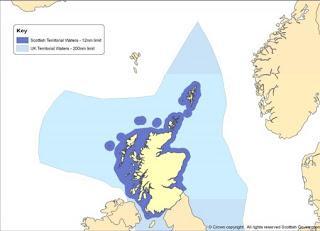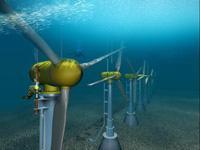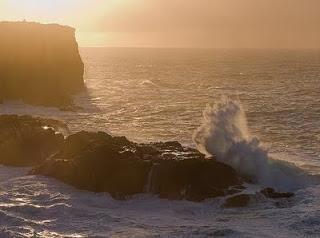
Image Source: http://farm3.staticflickr.com/2758/4458940223_4217467760.jpg
Hello Internet,
I'd like to start by letting you know that generally in the future when I am going to write posts related to science I intend to stick to more human biology related stuff (the stuff I will most likely end up researching later on in my degree), but after Ysabelle's post on Wednesday about Scottish Independence, it got me thinking about a project I had to do for an outside course of mine at University. The project was in my subject Marine Resources, and I had to write a newspaper article on Marine Renewable Energy, giving the arguments both for and against its expansion in the world, but particularly Scotland. In my concluding paragraph I make it quite clear what stance I take on this argument.
I hope you enjoy the read, and let me know what your views are in the comments, and as always, if you could share the blog on twitter/facebook/google+ etc.. that would be great!
#LovefromSteve.
 Is it Time to Renew our views on Marine Renewable Energy?
Is it Time to Renew our views on Marine Renewable Energy?What Does the Ocean Have to Offer?
It is clear that the world in which we live in is changing; we are facing more and more life threating climatic changes, stemming from global warming, rising sea levels and increasingly unpredictable and extreme weather patterns. Surely it is time for Scotland to play its part in trying to save the world as we know it today? There are three commonly known sources of Marine Renewable Energy: Offshore wind, Tidal and Wave. However, there is great controversy amongst the public as to whether Marine Renewable Energy is in fact the way to go about saving us from the energy crisis in which the world as a whole will soon face.
Keen for a Gusty Start
 Figure 1: Scottish Territorial and Offshore Waters Available for Development of Marine Renewables (Scottish Government, August 2012) It is believed that within the lifetime of this generation, the world will run out of its supply of fossil fuels. It is for this factor; along with others such as the production of harmful emissions by fossil fuels, that many believe the need for major investment in Marine Renewables is essential. This movement is supported by the Marine (Scotland) Act 2010. One of the main aims of which is to provide a framework that will help to balance the demands that are wanted from Scotland's seas, introducing the duty to protect its marine environment while having measures added to help enhance and boost investment and growth in areas such as Marine Renewables. It states that we ‘must act in the way best calculated to mitigate, and adapt to, climate change’.
Figure 1: Scottish Territorial and Offshore Waters Available for Development of Marine Renewables (Scottish Government, August 2012) It is believed that within the lifetime of this generation, the world will run out of its supply of fossil fuels. It is for this factor; along with others such as the production of harmful emissions by fossil fuels, that many believe the need for major investment in Marine Renewables is essential. This movement is supported by the Marine (Scotland) Act 2010. One of the main aims of which is to provide a framework that will help to balance the demands that are wanted from Scotland's seas, introducing the duty to protect its marine environment while having measures added to help enhance and boost investment and growth in areas such as Marine Renewables. It states that we ‘must act in the way best calculated to mitigate, and adapt to, climate change’. Those in favour of investment in Marine Renewables argue that there are too many positives, to let into consideration the potential and minute negatives that they may cause. They argue that the world is in an energy crisis, and an alternative to fuels is desperately needed, and is essential for human survival and progression. The vast numbers of positives that will be brought to the world’s environment are endless, helping to greatly reduce the amounts of harmful emissions that are being released into the atmosphere, in turn helping to slow the depletion of the ozone layer. It is also believed that the positives of marine renewables far outweigh any possible damage that the building of them could cause to the seas ecological systems, and that overtime they would counter-act the pollution caused in their development. When looking at wave power, it is clear that it can only produce positives for the environment – as it causes no harm to any ecosystems and requires only to be set on top of the water. With these factors in mind those in favour suggest that issues in the past that have arose because of fossil fuels put into perspective just how miniscule the threat of Marine Renewables really are to the environment. This is made clear by the BP deep water horizon oil spillage off the Gulf of Mexico in 2010, which not only killed thousands of animals and destroyed vast areas of habitat, but caused irreversible damage. With this, those in favour of Marine Renewables argue that there is no possible way that you can oppose the movement for their increase in the society and world in which we live today.
The Tides are Turning – Many Against Marine Renewables
 Figure 2: Visualisation of Seafloor Turbines (http://ocsenergy.anl.gov/guide/current/index.cfm)
Figure 2: Visualisation of Seafloor Turbines (http://ocsenergy.anl.gov/guide/current/index.cfm) In opposition, there is a strong force of people who believe that Marine Renewables are in no way the answer to our problems. The most widely argued point against the advancement of Marine Renewables is the vast ignorance that we have towards them, the marine environment and the impacts in which developing them on a large scale will cause to this.A common example used to demonstrate this is the effects that offshore wind farms and sea floor turbines cause. Both make use of currents on the sea bed, causing the disturbance of the corals, sponges, seafloor fish and shellfish that live there. These ecosystems would be greatly affected, if not destroyed if large scale marine renewable development occurred, and given the fact that they have in the past produced many undiscovered species, some argue that this is too great a risk to take. However, this point is disputed by those in favour of Marine Renewables who make reference to Marine Spatial Planning, a group of geodatabases created by the Scottish Government in order to ‘provide regional guidance to assist developers involved in identifying suitable sites’ and ‘to assist in the identification ofsites at depth of water, seabed slopes and distance offshore’. Again though, specialists who argue against the progression of Marine Renewables do not consider this argument to be valid, stating that we do not have the technology nor the equipment yet for these surveys to have been accurate enough for us to know everything we need to in order to go ahead with development on a large scale.
Are the Waves and Wind to Be our Future?

Figure 3: Photo of Waves off Coast of Scotland (http://1.bp.blogspot.com/_hntojuBOgo0/SpryPDwIduI/AAAAAAAAITk/hgpuzR-lE64/s400/ScottishWaveEnergy.jpg)
In conclusion, it is clear that there are a vast number of arguments both supporting and opposing the development of Marine Renewables. Those arguing in favour claim that the time is nigh; if we do not act fast the world as we know it will have already changed irreversibly. Those against argue that we cannot act yet as we are too ignorant in our knowledge of the ocean; any moves that we make could be catastrophically devastating for Scotland’s oceans and the ecosystems that reside within them. However, it is clear that action is needed and that if we utilise the information provided for us by a large number of scientific resources, such as Marine Spatial Planning, then we can move forward and advance in a safe a precautious way. Hopefully this approach could help to save our world as we know it, while still providing us with the energy and resources in which we now find essential for our survival as a species.
Bibliography
Scottish Government. (March 2011). Scotland's Marine Atlas. Scottish Government.
Scottish Parliament. (2010). Marine (Scotland) Act.
The Colorado River Commission of Nevada. (2002, March).
www.gcse.com. (n.d.). Wind Power Problems.
Figure 1: www.scotland.gov.uk/Resource/0040/00400731.pdf(2012).
Figure 2: www.ocsenergy.anl.gov/guide/current/index.cfm.
Figure 3: http://1.bp.blogspot.com/_hntojuBOgo0/SpryPDwIduI/AAAAAAAAITk/hgpuzR-lE64/s400/ScottishWaveEnergy.jpg
